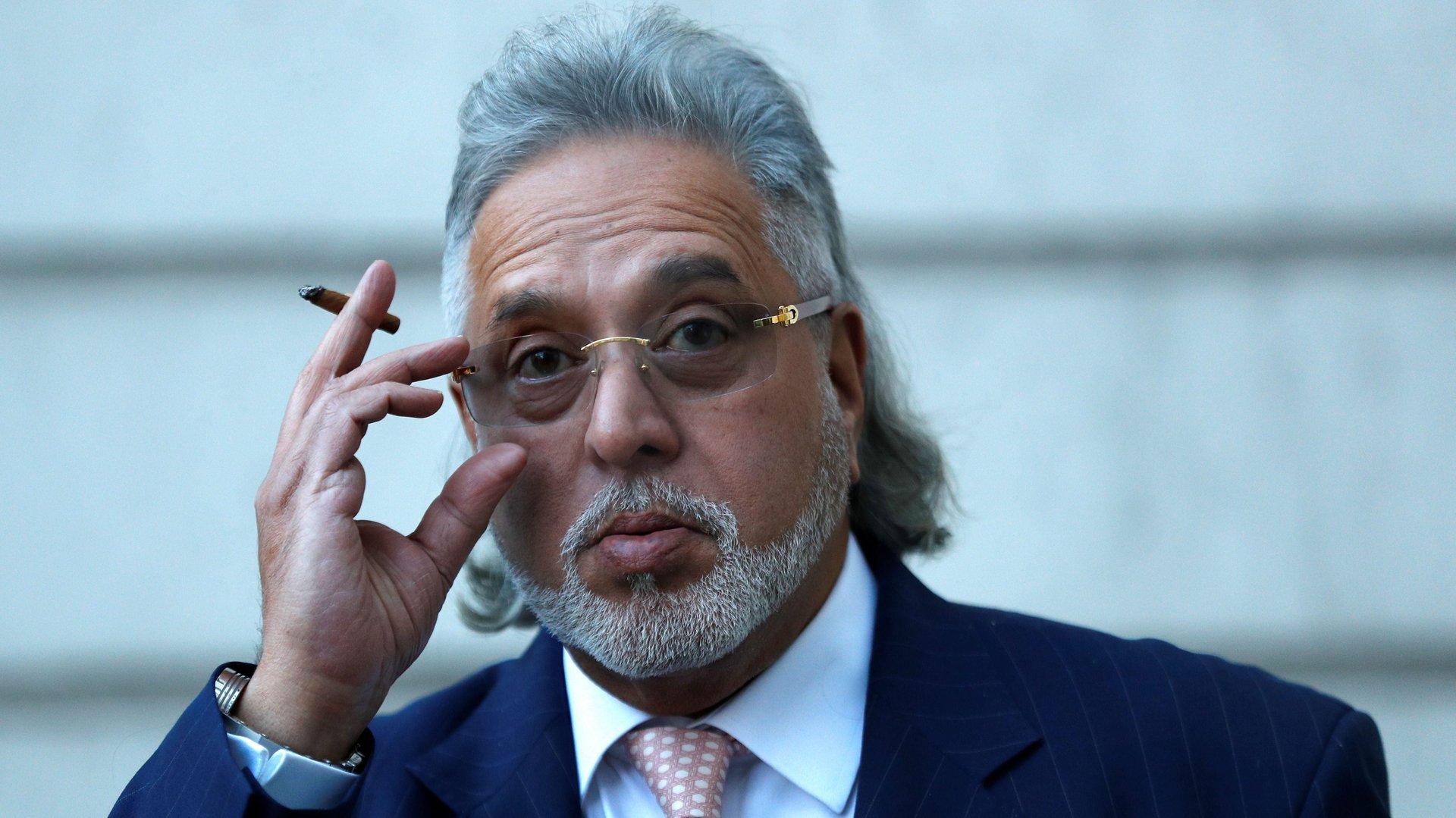A timeline of Vijay Mallya’s fall: From the king of good times to the poster boy of loan defaults
India may have moved one step closer to bringing back its most infamous debt defaulter, Vijay Mallya, who fled the country around three years ago.


India may have moved one step closer to bringing back its most infamous debt defaulter, Vijay Mallya, who fled the country around three years ago.
On Feb. 03, UK home secretary Sajid Javid approved India’s request to extradite Mallya, who is wanted for financial irregularities at his now-defunct Kingfisher Airlines. Mallya now has 14 days to appeal against the decision.
Kingfisher Airlines owes over Rs9,000 crore ($1.25 billion) to a clutch of banks led by India’s largest lender, the State Bank of India (SBI). The creditors have labelled the 63-year-old businessman a “wilful defaulter” and taken legal recourse over non-payment of loans.
Apart from banks’ dues, Kingfisher Airlines, which never made any profit during the seven years when it was flying, also owes Rs300 crore in salaries to around 3,000 employees.
India and the UK had signed an extradition treaty in 1993, which hasn’t been used often. Samirbhai Vinubhai Patel is the only Indian to have been extradited from the UK to India in 2016 for his alleged role in the 2002 Gujarat riots.
Mallya’s extradition would be a huge political victory for prime minister Narendra Modi’s government ahead of elections in India later this year. Soon after the UK authorities signed Mallya’s extradition order, India’s union minister Arun Jaitley proclaimed it as the Modi government’s victory.
However, the fugitive liquor baron may not be coming home anytime soon, as he has decided to initiate an appeal against his extradition.
While there’s still no clarity on when Mallya may be brought back to India, here’s a timeline of what brought down the “king of good times”:
May 2005: Mallya launches Kingfisher Airlines at a spectacular event in Mumbai. He says the company is a coming-of-age gift for his son Siddharth on his 18th birthday.
June 2007: Kingfisher Airlines picks up a 26% stake in low-cost airline Air Deccan for $135.57 million. (In 2014, a book about Mallya claims that he “bought Air Deccan with his eyes closed” and his team never went through the accounts of the loss-making carrier before agreeing to buy it.)
April 2008: Deccan Aviation, which ran Air Deccan, is merged with Kingfisher Airlines.
September 2008: Kingfisher Airlines launches international operations by connecting Bengaluru with London.
October 2009: Losses start mounting on the airline’s books. Kingfisher returns 19 leased aircraft to lessors over 10 months. The company says it’s part of a planned capacity reduction programme.
September 2011: By now, the company has a debt pile of $1.7 billion and has been struggling to pay salaries and jet fuel bills. Mallya shuts budget carrier Kingfisher Red in an attempt to stem losses. Aviation experts are still hopeful that Kingfisher Airlines isn’t likely to go under.
November 2011: Kingfisher falls to fifth place in domestic market share from third in the previous month after it grounds some planes to save money. The company is also forced to cancel tens of flights after state-owned oil companies refuse to grant it credit and put it on a cash-and-carry payment mode.
December 2011: Reports claim that Kingfisher Airlines has not deposited with the government most of the income tax deducted from its employees’ salaries for the last two fiscal years.
October 2012: Kingfisher Airlines is grounded after its staff, who have not been paid their salaries since months, decide not to work any longer. India’s aviation regulator suspends the airline’s flying licence after it fails to come up with a viable plan for its financial and operational revival.
November 2012: British spirits giant Diageo acquires a 53.4% stake in Mallya’s United Spirits for over $2 billion. But Mallya does not use the money to pay back his debts
January 2013: The airline loses its flying permit after it misses a deadline to renew its suspended licence.
February 2013: Lenders decide to start the recovery process for Rs7,500 crore loans given to Kingfisher. SBI has an exposure of Rs1,600 crore to Kingfisher, followed by Rs800 crore each for Punjab National Bank and IDBI Bank. The airline owes Rs650 crore to Bank of India and Rs550 crore to Bank of Baroda.
November 2015: SBI tags Mallya and two of his companies, Kingfisher Airlines and United Breweries Holdings, as wilful defaulters.
March 2016: Mallya leaves India after banks take a legal course to recover dues from Kingfisher Airlines. Days after he left the country, he takes to Twitter to accuse everyone—from media houses to banks—of trying to spread “lies” about him. ”I am an international businessman. I travel to and from India frequently. I did not flee from India and neither am I an absconder. Rubbish,” he posts on Twitter.
February 2017: The Narendra Modi government reportedly requested the UK to hasten the extradition process of 16 Indian nationals, including Mallya.
April 2017: Mallya is arrested in London by Scotland Yard and produced before the Westminster Magistrates’ Court. Shortly after his arrest, Mallya is granted bail. Mallya tweeted that his extradition hearings have begun.
December 2018: Mallya takes to Twitter to make a vehement appeal to his creditors to accept his offer of repaying the full principal amount he owes them. He blames extraneous factors for the sinking of Kingfisher Airlines. However, the principal amount is just around half of the airline’s total dues.
A magistrate court in the UK orders Mallya’s extradition.
February 2019: The UK home secretary approved Mallya’s extradition order. Mallya has 14 days to appeal against the decision.
He decides to initiate an appeal process against his extradition order.